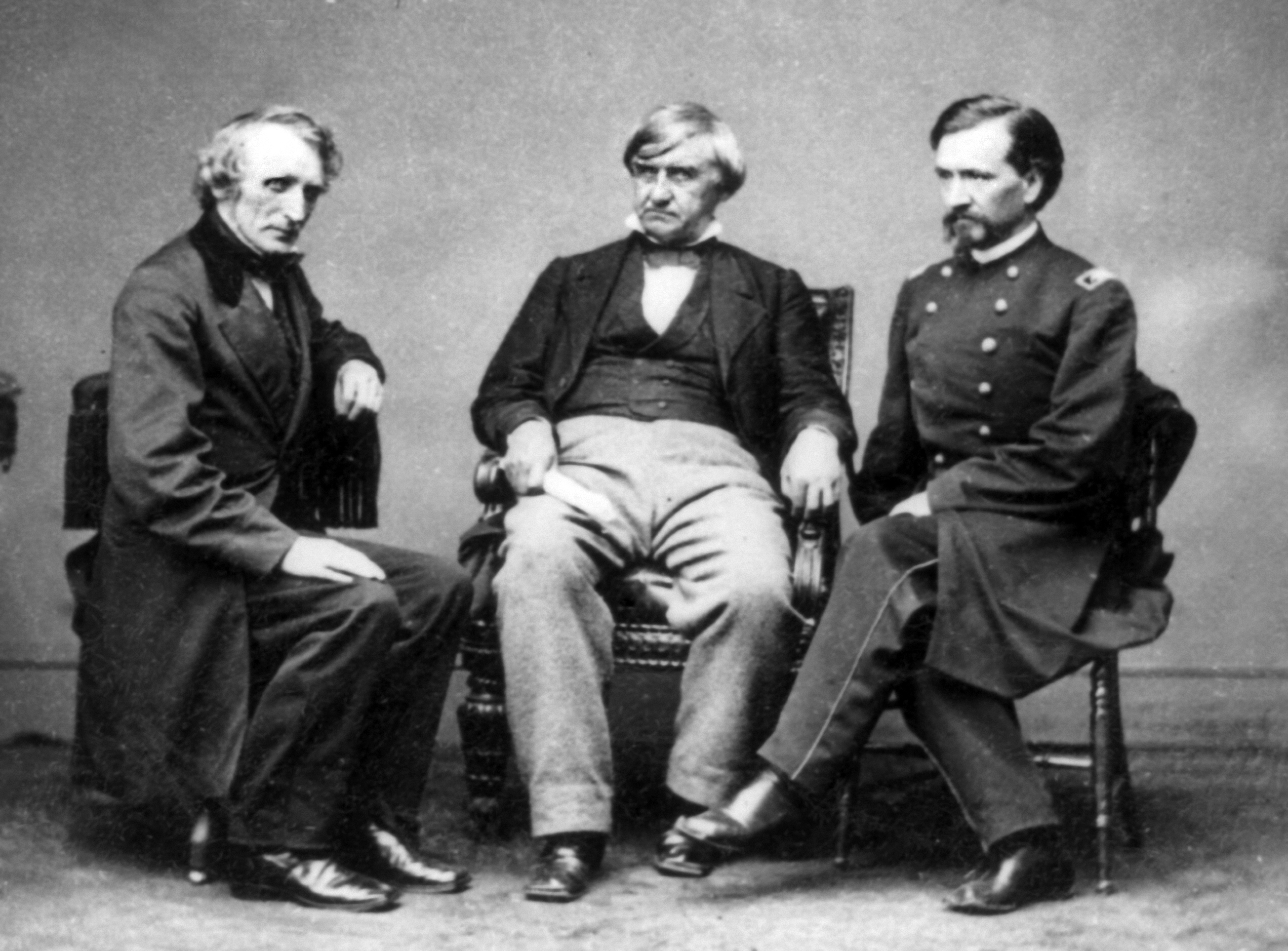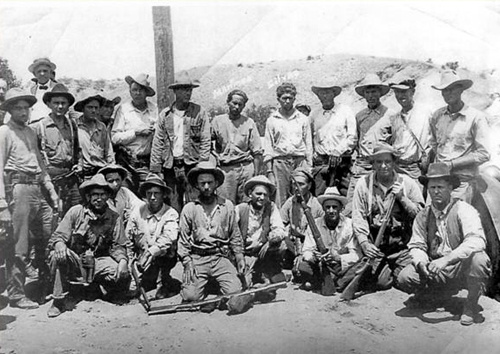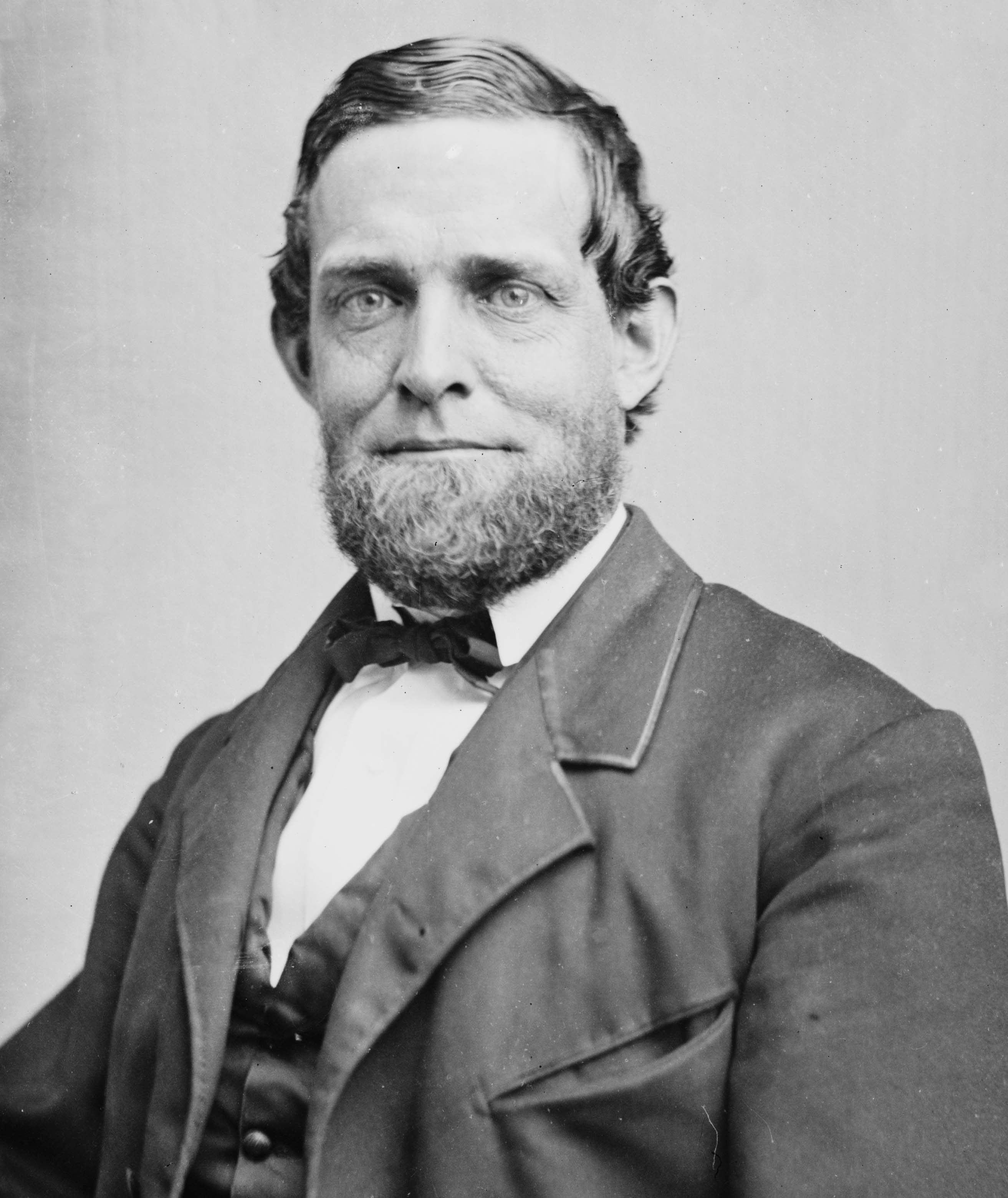|
Enforcement Act Of 1870
The Enforcement Act of 1870, also known as the Civil Rights Act of 1870 or First Ku Klux Klan Act, or Force Act (41st Congress, Sess. 2, ch. 114, , enacted May 31, 1870, effective 1871), is a United States federal law that empowers the President to enforce the first section of the Fifteenth Amendment throughout the United States. The act was the first of three Enforcement Acts passed by the United States Congress in 1870 and 1871, during the Reconstruction Era, to combat attacks on the voting rights of African Americans from state officials or violent groups like the Ku Klux Klan. The Enforcement Act of 1870 prohibits discrimination by state officials in voter registration on the basis of race, color, or previous condition of servitude. It establishes penalties for interfering with a person's right to vote and gave federal courts the power to enforce the act. The act also authorizes the President to use the army to uphold the act and use federal marshals to bring charges agai ... [...More Info...] [...Related Items...] OR: [Wikipedia] [Google] [Baidu] |
John Bingham
John Armor Bingham (January 21, 1815 – March 19, 1900) was an American politician who served as a Republican representative from Ohio and as the United States ambassador to Japan. In his time as a congressman, Bingham served as both assistant Judge Advocate General in the trial of the Abraham Lincoln assassination and a House manager (prosecutor) in the impeachment trial of U.S. President Andrew Johnson. He was also the principal framer of the Fourteenth Amendment to the United States Constitution. Early life and education Born in Mercer County, Pennsylvania, where his carpenter and bricklayer father Hugh had moved after service in the War of 1812, Bingham attended local public schools. After his mother's death in 1827, his father remarried. John moved west to Ohio to live with his merchant uncle Thomas after clashing with his new stepmother. He apprenticed as a printer for two years, helping to publish the ''Luminary'', an anti-Masonic newspaper. He then returned to ... [...More Info...] [...Related Items...] OR: [Wikipedia] [Google] [Baidu] |
Posse Comitatus
The ''posse comitatus'' (from Latin for "the ability to have a retinue or gang"), frequently shortened to posse, is in common law a group of people mobilized to suppress lawlessness, defend the people, or otherwise protect the place, property, and public welfare. It may be called by the conservator of peace – typically a reeve, sheriff, chief, or another special/regional designee like an officer of the peace potentially accompanied by or with the direction of a justice or ajudged parajudicial process given the imminence of actual damage. There must be a lawful reason for a posse, which can never be used for lawlessness. The ''posse comitatus'' as an English jurisprudentially defined doctrine dates back to 9th-century England. Etymology Derived from Latin, ''posse comitātūs'' ("posse" here used as a noun means the ability or power while "comittus" is an abstract noun which means a retinue, especially a small military force or bodyguard) is sometimes shortened to simply '' ... [...More Info...] [...Related Items...] OR: [Wikipedia] [Google] [Baidu] |
Indiana
Indiana ( ) is a U.S. state, state in the Midwestern United States, Midwestern region of the United States. It borders Lake Michigan to the northwest, Michigan to the north and northeast, Ohio to the east, the Ohio River and Kentucky to the south and southeast, and the Wabash River and Illinois to the west. Nicknamed "the Hoosier State", Indiana is the List of U.S. states and territories by area, 38th-largest by area and the List of U.S. states and territories by population, 17th-most populous of the List of states and territories of the United States, 50 states. Its capital and largest city is Indianapolis. Indiana was admitted to the Union as the 19th state on December 11, 1816. Indigenous peoples of the Americas, Indigenous resistance to American settlement was broken with defeat of the Tecumseh's confederacy in 1813. The new settlers were primarily Americans of British people, British ancestry from the East Coast of the United States, eastern seaboard and the Upland South ... [...More Info...] [...Related Items...] OR: [Wikipedia] [Google] [Baidu] |
Oliver P
Oliver may refer to: Arts, entertainment and literature Books * ''Oliver the Western Engine'', volume 24 in ''The Railway Series'' by Rev. W. Awdry * ''Oliver Twist'', a novel by Charles Dickens Fictional characters * Ariadne Oliver, in the novels of Agatha Christie * Oliver (Disney character) * Oliver Fish, a gay police officer on the American soap opera ''One Life to Live'' * Oliver Hampton, in the American television series ''How to Get Away with Murder'' * Oliver Jones (''The Bold and the Beautiful''), on the American soap opera ''The Bold and the Beautiful'' * Oliver Lightload, in the movie ''Cars'' * Oliver Oken, from ''Hannah Montana'' * Oliver (paladin), a paladin featured in the Matter of France * Oliver Queen, DC Comic book hero also known as the Green Arrow * Oliver (Thomas and Friends character), a locomotive in the Thomas and Friends franchise * Oliver Trask, a controversial minor character from the first season of ''The O.C.'' * Oliver Twist (cha ... [...More Info...] [...Related Items...] OR: [Wikipedia] [Google] [Baidu] |
Vermont
Vermont () is a U.S. state, state in the New England region of the Northeastern United States. It borders Massachusetts to the south, New Hampshire to the east, New York (state), New York to the west, and the Provinces and territories of Canada, Canadian province of Quebec to the north. According to the most recent U.S. Census estimates, the state has an estimated population of 648,493, making it the List of U.S. states and territories by population, second-least populated of all U.S. states. It is the nation's List of U.S. states and territories by area, sixth smallest state in area. The state's capital of Montpelier, Vermont, Montpelier is the least populous List of capitals in the United States, U.S. state capital. No other U.S. state has a List of largest cities of U.S. states and territories by population, most populous city with fewer residents than Burlington, Vermont, Burlington. Native Americans in the United States, Native Americans have inhabited the area for abou ... [...More Info...] [...Related Items...] OR: [Wikipedia] [Google] [Baidu] |
George F
George may refer to: Names * George (given name) * George (surname) People * George (singer), American-Canadian singer George Nozuka, known by the mononym George * George Papagheorghe, also known as Jorge / GEØRGE * George, stage name of Giorgio Moroder * George, son of Andrew I of Hungary Places South Africa * George, South Africa, a city ** George Airport United States * George, Iowa, a city * George, Missouri, a ghost town * George, Washington, a city * George County, Mississippi * George Air Force Base, a former U.S. Air Force base located in California Computing * George (algebraic compiler) also known as 'Laning and Zierler system', an algebraic compiler by Laning and Zierler in 1952 * GEORGE (computer), early computer built by Argonne National Laboratory in 1957 * GEORGE (operating system), a range of operating systems (George 1–4) for the ICT 1900 range of computers in the 1960s * GEORGE (programming language), an autocode system invented by Charles Leo ... [...More Info...] [...Related Items...] OR: [Wikipedia] [Google] [Baidu] |
United States Senate
The United States Senate is a chamber of the Bicameralism, bicameral United States Congress; it is the upper house, with the United States House of Representatives, U.S. House of Representatives being the lower house. Together, the Senate and House have the authority under Article One of the United States Constitution, Article One of the Constitution of the United States, U.S. Constitution to pass or defeat federal legislation. The Senate also has exclusive power to confirm President of the United States, U.S. presidential appointments, to approve or reject treaties, and to convict or exonerate Impeachment in the United States, impeachment cases brought by the House. The Senate and the House provide a Separation of powers under the United States Constitution, check and balance on the powers of the Federal government of the United States#Executive branch, executive and Federal judiciary of the United States, judicial branches of government. The composition and powers of the Se ... [...More Info...] [...Related Items...] OR: [Wikipedia] [Google] [Baidu] |
House Of Representatives Of The United States
The United States House of Representatives is a chamber of the bicameral United States Congress; it is the lower house, with the U.S. Senate being the upper house. Together, the House and Senate have the authority under Article One of the U.S. Constitution to pass or defeat federal legislation, known as bills. Those that are also passed by the Senate are sent to the president for signature or veto. The House's exclusive powers include initiating all revenue bills, impeaching federal officers, and electing the president if no candidate receives a majority of votes in the Electoral College. Members of the House serve a fixed term of two years, with each seat up for election before the start of the next Congress. Special elections also occur when a seat is vacated early enough. The House's composition was established by Article One of the United States Constitution. The House is composed of representatives who, pursuant to the Uniform Congressional District Act, sit i ... [...More Info...] [...Related Items...] OR: [Wikipedia] [Google] [Baidu] |
41st United States Congress
The 41st United States Congress was a meeting of the legislative branch of the United States federal government, consisting of the United States Senate and the United States House of Representatives. It met in Washington, D.C. from March 4, 1869, to March 4, 1871, during the first two years of Ulysses S. Grant's presidency. The apportionment of seats in the House of Representatives was based on the 1860 United States census. Both chambers had a Republican majority. Major events * March 4, 1869: Ulysses Grant became President of the United States * March 4, 1869: Carl Schurz R-Missouri became the first German American to serve in the United States Senate * May 10, 1869: Golden spike marked the completion of the First transcontinental railroad in Promontory, Utah * December 10, 1869: Wyoming Territory gave women the right to vote, one of the first such laws in the world * February 12, 1870: Utah Territory gave women the right to vote * February 25, 1870: Senator Hiram Rhodes ... [...More Info...] [...Related Items...] OR: [Wikipedia] [Google] [Baidu] |
United States Electoral College
In the United States, the Electoral College is the group of presidential electors that is formed every four years for the sole purpose of voting for the President of the United States, president and Vice President of the United States, vice president in the United States presidential election, presidential election. This process is described in Article Two of the United States Constitution, Article Two of the Constitution. The number of electors from each U.S. state, state is equal to that state's United States congressional apportionment, congressional delegation which is the number of List of current United States senators, senators (two) plus the number of US Representatives, Representatives for that state. Each state Article II of the United States Constitution#Clause 2: Method of choosing electors, appoints electors using legal procedures determined by its State legislature (United States), legislature. Federal government of the United States, Federal office holders, inclu ... [...More Info...] [...Related Items...] OR: [Wikipedia] [Google] [Baidu] |
Civil Rights Act Of 1866
The Civil Rights Act of 1866 (, enacted April 9, 1866, reenacted 1870) was the first United States federal law to define citizenship and affirm that all citizens are equally protected by the law. It was mainly intended, in the wake of the American Civil War, to protect the civil rights of persons of African descent born in or brought to the United States. Civil Rights Act of 1866 The Act was passed by Congress in 1866 and vetoed by U.S. President Andrew Johnson. In April 1866, Congress again passed the bill to support the Thirteenth Amendment, and Johnson again vetoed it, but a two-thirds majority in each chamber overrode the veto to allow it to become law without presidential signature. John Bingham and other congressmen argued that Congress did not yet have sufficient constitutional power to enact this law. Following passage of the Fourteenth Amendment in 1868, Congress ratified the 1866 Act in 1870. Primary objectives, introduction and amendment The act had three pri ... [...More Info...] [...Related Items...] OR: [Wikipedia] [Google] [Baidu] |
Confiscation Act Of 1862
The Confiscation Act of 1862, or Second Confiscation Act, was a law passed by the United States Congress during the American Civil War. This statute was followed by the Emancipation Proclamation, which President Abraham Lincoln issued "in his joint capacity as President and Commander-in-Chief". History The Confiscation Act was enacted on July 17, 1862. The defining characteristic of the act was that it called for court proceedings for seizure of land and property from disloyal citizens (supporters of the Confederacy) in the South as well as the emancipation of their slaves that came under Union control. Under this act, conviction of treason against the U.S. could be punishable by death or carry a minimum prison sentence of five years and a minimum fine of $10,000. This law also stated that any citizen convicted of aiding and abetting any person known to have committed treason against the United States could be imprisoned for up to 10 years and face a maximum fine of $200,000, if c ... [...More Info...] [...Related Items...] OR: [Wikipedia] [Google] [Baidu] |




